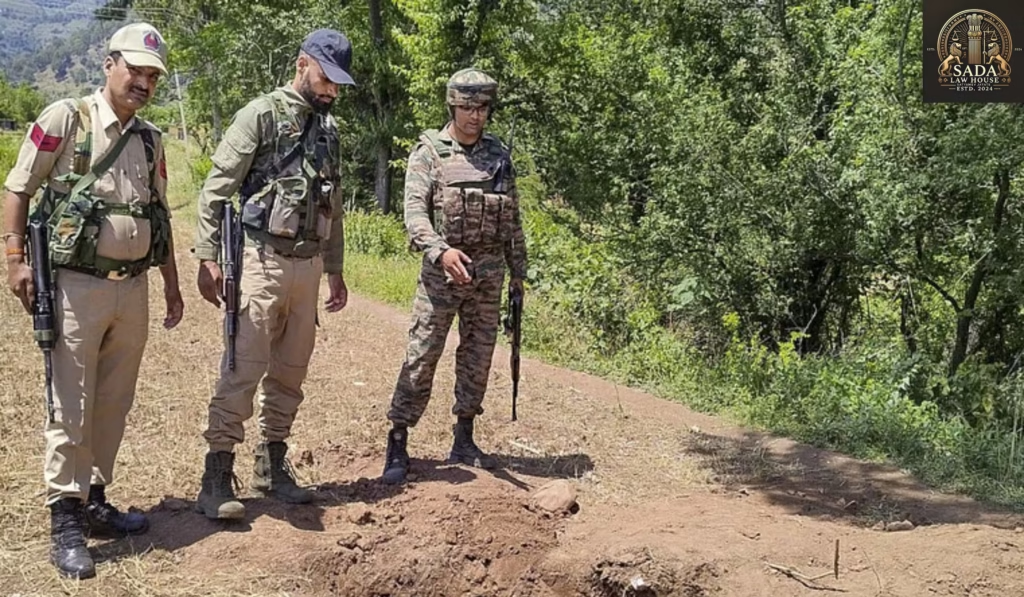Three Lashkar Militants Killed in Shopian Encounter Amid Rising India-Pakistan Tensions
Trending Today Sonu Nigam Seeks Dismissal of FIR Over Alleged Remarks Against Kannadigas at Bengaluru Concert Supreme Court Revokes Ban on ‘4PM News’ YouTube Channel, Questions IT Blocking Rules Allahabad High Court Stays Suspension of UP DSP Accused of Extramarital Affair Three Lashkar Militants Killed in Shopian Encounter Amid Rising India-Pakistan Tensions Pakistan Admits Aircraft Damage After Precision Indian Strikes in Operation Sindoor Rahul Gandhi Faces Court Complaint Over “Mythological” Remark About Lord Rama in US Delhi Airport Disruptions: 97 Flights Cancelled, 150 Delayed Amid Regional Tensions Stalker Arrested for Chemical Attack on Female Advocate Amid Months of Harassment Patna HC Rules Mandatory Retirement for Unapproved Absences as Excessive: A Case Analysis Pakistan Air Force Officer Admits Role in Pulwama Attack: Tactical Brilliance or Strategic Misstep? Three Lashkar Militants Killed in Shopian Encounter Amid Rising India-Pakistan Tensions MAHI SINHA 14 May 2025 Three Lashkar-e-Taiba militants were killed in an encounter with security forces in Shopian, Jammu & Kashmir. This incident follows a recent surge in India–Pakistan border tensions and a deadly attack in Pahalgam. Three Lashkar-e-Taiba Militants Killed in Shopian Encounter Three militants from the Lashkar-e-Taiba (LeT) terrorist group were gunned down in an encounter with Indian security forces in the Keller area of Shopian, Jammu and Kashmir, on May 13, 2025. Security Forces Launch Search Operation in Shukroo Keller The confrontation occurred after Indian forces received specific intelligence about militant presence in the Shukroo Keller region. A coordinated cordon and search operation was launched by the Indian Army and Jammu and Kashmir Police to track down the suspected terrorists. As the operation commenced, the militants opened fire, initiating a fierce gunfight. The encounter ended with the elimination of all three militants. Authorities are currently working to confirm their identities. Background: Rising Tensions After Pahalgam Attack This development comes shortly after the deadly terrorist attack in Pahalgam on April 22, which led to increased tensions between India and Pakistan. In response, both nations agreed to a ceasefire, aiming to de-escalate the conflict. Pakistan’s Drone Strikes Escalate the Conflict Despite the ceasefire, Pakistan reportedly launched drone strikes targeting regions including Gujarat, Punjab, Rajasthan, and Jammu & Kashmir. Indian air defense systems successfully intercepted these threats, though the attacks have fueled fears of a broader conflict between the two nuclear-armed neighbors. India’s Firm Stance on Future Terror Attacks In a strong statement following the incident, the Indian government declared that any future act of terror on Indian soil would be regarded as an “act of war.” A senior official emphasized that this marks a formal shift in India’s counter-terrorism policy and defines a red line for terror groups operating from across the border. Conclusion: Tensions Remain High in Jammu and Kashmir While the elimination of the three Lashkar-e-Taiba militants is seen as a tactical win, the region remains on high alert. Ongoing ceasefire violations and military actions suggest that peace in Jammu and Kashmir is still fragile, with broader geopolitical implications for South Asia. Leave a Reply Cancel Reply Logged in as Sada Law. Edit your profile. Log out? Required fields are marked * Message* Live Cases Sonu Nigam Seeks Dismissal of FIR Over Alleged Remarks Against Kannadigas at Bengaluru Concert Sonu Nigam Seeks Dismissal of FIR Over Alleged Remarks Against Kannadigas at Bengaluru Concert Sada Law • May 14, 2025 • Live cases • No Comments Supreme Court Revokes Ban on ‘4PM News’ YouTube Channel, Questions IT Blocking Rules Supreme Court Revokes Ban on ‘4PM News’ YouTube Channel, Questions IT Blocking Rules Sada Law • May 14, 2025 • Live cases • No Comments Allahabad High Court Stays Suspension of UP DSP Accused of Extramarital Affair Allahabad High Court Stays Suspension of UP DSP Accused of Extramarital Affair Sada Law • May 14, 2025 • Live cases • No Comments 1 2 3 … 5 Next »
Three Lashkar Militants Killed in Shopian Encounter Amid Rising India-Pakistan Tensions Read More »







